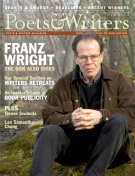Once upon a time, there was an assistant professor at the University of Alabama who wanted to start a literary magazine devoted to contemporary literary fairy tales. So she did. In the debut issue of the annual Fairy Tale Review (www.fairytalereview.com), editor Kate Bernheimer writes that she hopes it will "provide an elegant and innovative venue for all writers working with the aesthetics and motifs of fairy tales." Among the poets and fiction writers whose work is included in the issue are Kim Addonizio, Joshua Beckman, Aimee Bender, Matthew Rohrer, Donna Tartt, and Stacy Richter—all of whom support Bernheimer's assertion that the fairy tale is a legitimate, literary mode of expression. So she lived happily ever after. The end.
Ever since Proust chomped down on his madeleine, food has been a common go-to for writers seeking some high-caloric inspiration, but publisher Paulette Licitra's biannual Alimentum (www.alimentumjournal.com) might be the first journal dedicated exclusively to "the literature of food." In addition to poems, short stories, and an interview with Mark Kurlansky, the best-selling author of Salt: A World History, the debut issue of Alimentum features some attempts at an interesting subgenre—the literary recipe. Foodies will want to don their Kiss the Cook aprons and sharpen their Wüsthof knives before reading Mina Samuels's essay "Memoir of a Utensil Meal," which includes a recipe for "Old-Fashioned Macaroni & Cheese," and Rebecca Schuman's instructions for "The Schumanwich," which is composed of an apple, some peanut butter, and two slices of bread, grilled to perfection. One can safely assume that New York's French Culinary Institute, a sponsor of Alimentum, has not yet endorsed the delectable concoction.
Readers who are feeling slightly disoriented—don't worry, you're not alone—should consider two new literary magazines that each take as one of their founding principles the inevitability of feeling a little lost now and again. The online monthly magazine Lost (www.lostmag.com), which was launched last December, "uses prose to reclaim lost people, places, and things," says founding editor John Parsley, who is also an editor at the St. Martin's Press imprint Thomas Dunne Books. The first issue of Lost includes an essay by Mary Roach, the author of Spook: Science Tackles the Afterlife, on whether there is a soul that survives after death; and a "rumination on circumcision" by Grant Stoddard, among other works of fiction and nonfiction. Dislocate (www.dislocate.org), the annual literary journal published by the creative writing program at the University of Minnesota in Minneapolis, is a little less direct in its treatment of the "lost" theme. Elizabeth Willis's poem "Irregular Winds From Other Causes," the first in the debut print issue—the online edition of Dislocate has been around since 2001—features the following line: "No one knows where to fly anymore, with early sun curtained in imitation suede." Much of the work in the issue, including poems by Stephen Burt ("the black-billed tern / who perches on our lunch // no longer exists / in our world"), Eric Baus ("This is where I live but these are not my clothes"), and Esther Lee ("I keep leaving behind my personal belongings"), could be considered variations on that sentiment.
Most bilingual literary magazines—Tameme (www.tameme.org), Double Change (www.doublechange.com), Storie (www.storie.it), and Terra Incognita (www.terraincognita.50megs.com) among them—include the full text of poems, stories, or essays in English as well as in another language. Not so with carnet de route, the annual journal that was launched in Paris late last year. While it is indeed a bilingual publication—it includes poems and short essays from France, England and Wales, and the United States—carnet de route does not offer parallel translations of the featured work. So readers of the first issue who don't parlez vous français will have to settle for the inspired design of the pages dedicated to writing from France, and stick to reading the work of such American poets as Brenda Hillman, Geoffrey Nutter, and Rusty Morrison, and British poets Jacob Polley and Rhian Saadat. As editor Molly Lou Freeman explains, carnet de route "seeks to present original work in its original form." Bottom line: Nothing is lost in translation.
Kevin Larimer is the senior editor of Poets & Writers Magazine.








